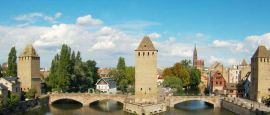Strasbourg History
Strasbourg, or ‘the town at the crossroads’, has always occupied a strategic position in >Europe.
Originally a Roman camp called Argentoratum, it served as a defensive fort. The streets of this small, fortified area built on a marshy island on the Ill river would later become the city of Strasbourg.
In 1262, Strasbourg became a free city of the Germanic Holy Roman Empire and, behind its fortified walls, power gravitated around the emblematic Pfalz, or town hall.
Strasbourg was annexed to France in 1681 as Louis XV realised its strategic importance.
The 18th century witnessed the start of a burgeoning court of nobles and wealthy bourgeois, who built numerous mansions such as those in rue Brûlée and rue de la Nuée Bleue.
The French Revolution in 1792 left the city in a terrible state; many churches and cloisters were destroyed or damaged.
However, after 1830, Strasbourg consolidated its position as a major European crossroads and began to modernise.
With the growth of industry, the city’s population tripled in the 19th century. The sewage system was built, streets were paved, and the Rhone-Rhine Canal and Marais-Vert railway station opened.
In 1871, after the Franco-Prussian war, Strasbourg was annexed to the newly established German Empire. The city was rebuilt and developed on a grand scale (the Neue Stadt or ‘new city’).
Strasbourg returned to France after WWI. The war had not notably damaged the city and between the two wars, Strasbourg continued to prosper.
But after the German invasion of Poland in September 1939, the entire city was evacuated. With the Fall of France in June 1940, Alsace was annexed to Germany.
After liberation in 1944, Alsace was returned to France and Strasbourg became the symbol of reconciliation between France and Germany.
Strasbourg is now the seat of several European institutions including the Council of Europe, the European Court of Human Rights and the European Parliament.
Did you know?
• ‘La Marseillaise’ was composed in Strasbourg in 1792.
• Strasbourg’s historic centre was designated a UNESCO World Heritage site in 1988.
• Strasbourg Cathedral celebrated its 1,000th birthday in 2015.
Do you have any Feedback about this page?
© 2026 Columbus Travel Media Ltd. All rights reserved. No part of this site may be reproduced without our written permission, click here for information on Columbus Content Solutions.




 You know where
You know where